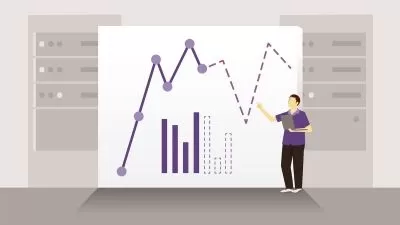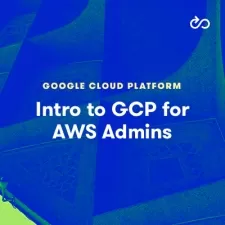Google Cloud Machine Learning Engineer Certification Prep
Dan Sullivan
4:29:28
Description
Building, Deploying, and Managing Machine Learning Services at Scale
What You'll Learn?
- Understand how to use Google Cloud services to build, deploy, and manage machine learning models in production
- Use Vertex AI, BigQuery, Cloud Dataflow, and Cloud Dataproc in ML pipelines
- Tune training and serving pipelines
- Choose appropriate infrastructure, including virtual machines, containers, GPUs and TPUS
- How to secure data in ML operations while protecting privacy
- Monitor machine learning models in production and know when to retrain models
- Explore datasets to identify problems and resolve issues such as class imbalance and insufficient data
Who is this for?
What You Need to Know?
More details
DescriptionMachine Learning Engineer is a rewarding, in demand role, and increasingly important to organizations moving building data intensive services in the cloud. The Google Cloud Professional Machine Learning Engineer certification is one of the field's most recognized credentials. This course will help prepare you to take and pass the exam. Specifically, this course will help you understand the details of:
Building and deploying ML models to solve business challenges using Google Cloud services and best practices for machine learning
Aspects of machine learning model architecture, data pipelines structures, optimization, as well as monitoring model performance in production
Fundamental concepts of model development, infrastructure management, data engineering, and data governance
Preparing data, optimizing storage formats, performing exploratory data analysis, and handling missing data
Feature engineering, data augmentation, and feature encoding to maximize the likelihood of building successful models
Understand responsible AI throughout the ML development process and apply proper controls and governance to ensure fairness in machine learning models.
By the end of this course, you will know how to use Google Cloud services for machine learning and just as importantly, you will understand machine learning concepts and techniques needed to use those services effectively.
Unlike courses that set out to teach you how to use particular Google Cloud services, this course is designed to teach you services as well as all the topics covered in the Google Cloud Professional Machine Learning Exam Guide, including machine learning fundamentals and techniques.
The course begins with a discussion of framing business problems as machine learning problems followed by a chapter on the technical framing on ML problems. We next review the architecture of training pipelines and supporting ML services in Google Cloud, such as:
Vertex AI Datasets
AutoML
Vertex AI Workbenches
Cloud Storage
BigQuery
Cloud Dataflow
Cloud Dataproc.Â
Machine learning and infrastructure and security are reviewed next.
We then shift focus to building and implementing machine learning models starting with managing and preparing data for machine learning, building machine learning models, and training and testing machine learning models. This is followed by chapters on machine learning serving and monitoring and tuning and optimizing both the training and serving of machine learning models.
Machine learning operations, also known as MLOps, borrow heavily from software engineering practices. As a machine engineer, you will use your understanding of software engineering practices and apply them to machine learning. Machine learning engineers know how to use ML tools, build models, deploy to production, and monitor ML services. They also know how to tune pipelines and optimize the use of compute and storage resources. Â
Machine learning engineers and data engineers complement each other. Data engineers build services and pipelines for collecting, storing, and managing data while machine learning engineers use those data services as a starting point for accessing data and building ML models to solve specific business problems.
Who this course is for:
- ML Engineers who wish to pass the Google Cloud Professional Machine Learning certification exam.
- Beginner machine learning engineers wanting to understand MLOps
- Software developers who want to use ML services to use ML as an alternative to coding solutions
- Cloud architects who want to understand how to design for machine learning serivces
- Data engineers who want to expand their skillset to include machine learning operations
- Data analysts and data scientists who want to use machine learning in their work.
Machine Learning Engineer is a rewarding, in demand role, and increasingly important to organizations moving building data intensive services in the cloud. The Google Cloud Professional Machine Learning Engineer certification is one of the field's most recognized credentials. This course will help prepare you to take and pass the exam. Specifically, this course will help you understand the details of:
Building and deploying ML models to solve business challenges using Google Cloud services and best practices for machine learning
Aspects of machine learning model architecture, data pipelines structures, optimization, as well as monitoring model performance in production
Fundamental concepts of model development, infrastructure management, data engineering, and data governance
Preparing data, optimizing storage formats, performing exploratory data analysis, and handling missing data
Feature engineering, data augmentation, and feature encoding to maximize the likelihood of building successful models
Understand responsible AI throughout the ML development process and apply proper controls and governance to ensure fairness in machine learning models.
By the end of this course, you will know how to use Google Cloud services for machine learning and just as importantly, you will understand machine learning concepts and techniques needed to use those services effectively.
Unlike courses that set out to teach you how to use particular Google Cloud services, this course is designed to teach you services as well as all the topics covered in the Google Cloud Professional Machine Learning Exam Guide, including machine learning fundamentals and techniques.
The course begins with a discussion of framing business problems as machine learning problems followed by a chapter on the technical framing on ML problems. We next review the architecture of training pipelines and supporting ML services in Google Cloud, such as:
Vertex AI Datasets
AutoML
Vertex AI Workbenches
Cloud Storage
BigQuery
Cloud Dataflow
Cloud Dataproc.Â
Machine learning and infrastructure and security are reviewed next.
We then shift focus to building and implementing machine learning models starting with managing and preparing data for machine learning, building machine learning models, and training and testing machine learning models. This is followed by chapters on machine learning serving and monitoring and tuning and optimizing both the training and serving of machine learning models.
Machine learning operations, also known as MLOps, borrow heavily from software engineering practices. As a machine engineer, you will use your understanding of software engineering practices and apply them to machine learning. Machine learning engineers know how to use ML tools, build models, deploy to production, and monitor ML services. They also know how to tune pipelines and optimize the use of compute and storage resources. Â
Machine learning engineers and data engineers complement each other. Data engineers build services and pipelines for collecting, storing, and managing data while machine learning engineers use those data services as a starting point for accessing data and building ML models to solve specific business problems.
Who this course is for:
- ML Engineers who wish to pass the Google Cloud Professional Machine Learning certification exam.
- Beginner machine learning engineers wanting to understand MLOps
- Software developers who want to use ML services to use ML as an alternative to coding solutions
- Cloud architects who want to understand how to design for machine learning serivces
- Data engineers who want to expand their skillset to include machine learning operations
- Data analysts and data scientists who want to use machine learning in their work.
User Reviews
Rating
Dan Sullivan
Instructor's Courses
Udemy
View courses Udemy- language english
- Training sessions 60
- duration 4:29:28
- Release Date 2022/11/27

















